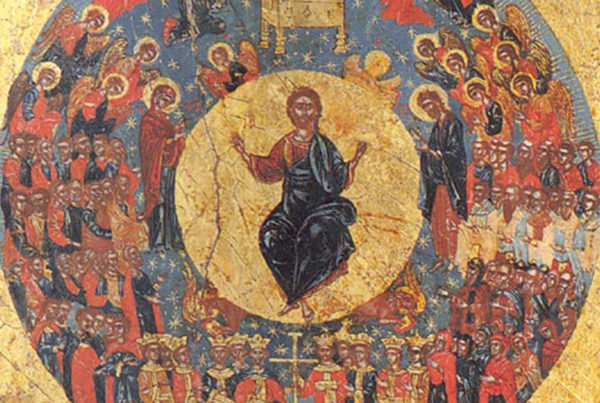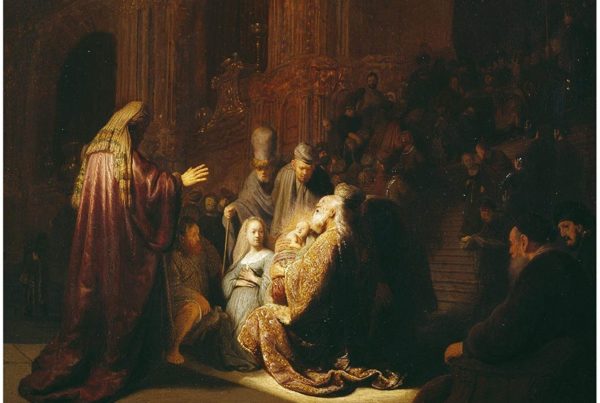As we all know by now, Don Miller has “left the church”… or at least, that’s the impression you’d get if you read all the response to his blog posts a couple weeks ago. Since I’ve seen a bit more commentary on the subject over the last few days, I thought I’d finally chime in.
Actually, what Don said was that he doesn’t really connect with God through the corporate worship gathering (he’s critiquing evangelical worship gatherings here, where the worship service is primarily singing and a lecture by a smart Bible-guy), that he connects with God better through nature and his work, and by spending time in robust community with people he cares about–many of whom are Christian.
I can’t say that I was surprised, offended, or even alarmed by all of this. I don’t think that makes me special; it’s just that as a self-aware non-Catholic/non-Orthodox, I understand the precariousness of my position. I belong to and pastor a non-denominational church. We have built our own community, selected our own liturgy, and though we work hard to make sure what we teach and believe lines up with what Mother Church has always taught, still within that we’ve been just a little selective… I love and freely quote Augustine, but I don’t embrace his views on everything. And of course as much as I want to say that we’re submitting our life and teaching to the faith of the Church, one must ask the question – which “Church”? The one that thinks that what we’re doing is probably spiritually beneficial but ultimately not a true expression of the Church (see Roman Catholics, Orthodox, etc)? Or the “Church” that I’ve concocted out of my own mind and within the spectrum of my own selectivity?
These are the problems that Protestants and Evangelicals of all stripes must inevitably face, and they are why the critiques of Don Miller, as valuable as they are, ultimately ring hollow to me. Don has chosen to form a certain kind of community–dependent as it is on Mother Church–that doesn’t worship in the so-called “normal” way. He wants to claim that he has not left the Church, or orthodoxy, but that he understands why those of us he’s supposedly “left behind” do not understand. Does this sound eerily familiar to anyone else but me?
We wring our hands, we fret and worry. How will Don stay orthodox in his faith? What will happen if others follow him? Can you just imagine the departures from fidelity and crazy heresies that will spin out of this? He’s sawing off the very branch he’s sitting on!
I would like to modestly submit that the reason we’re doing this is because deep down, there is a nagging voice in the back of our Protestant heads that says, “Don is doing what we’ve all been doing since the Reformation… we’ve all sawed off the branch we’re sitting on, and we’re deathly afraid that really, we’re all falling.”
That fear must be named, lest we vilify, slander, and ultimately bid “farewell” to Don for crimes we’re all guilty of. Unless we’re all willing to go back to the Catholic or Orthodox Church, we all need to just take a minute and admit that this Protestant/Evangelical experiment that we’re all in is just that… an experiment. We’ve departed to try doctrinal and liturgical experiments that apparently Mother Church never thought of… and when all is said and done, history may prove that it was a good experiment–that it brought needed freshness and reform to the global Church, and that to that extent it was indeed a movement of the Holy Spirit. Or history may prove that it was a complete disaster–heresies, schisms, enmities and factions. Or perhaps history will prove that it was somewhere in the middle–that for a time, some folks with valid critiques stepped away from Mother Church in order to create a sort of prophetic witness against that which they were departing from… that in some ways they succeeded, and in other ways they failed.
None of us knows. I for one sense that the Spirit is breathing on what I’m working on, and what I’ve committed myself to. I believe in the value of it, even if I cannot wrap my mind around how it fits within the plan of God. I make no claim that the peculiar and socially conditioned form of “gathering” I happen to pastor (and prefer, to be quite honest) is something ultimate. It’s an experiment. I sense Jesus in it. I hope that others (particularly my Catholic and Orthodox friends) will respect that and see the fruit of the Spirit in my life. But I can’t demand that they do.
And when the Don Millers of the world say that they don’t want to participate in gatherings that me and my “Protesting” friends have created, and ask that I try to respect the form of Jesus-centered community and spirituality that he (in his protest) is creating, it is disingenuous at best, outrageously hypocritical at worst for me to get angry at him, label him a heretic, and excommunicate him.
I’m not saying that I think what he’s doing is a great idea, but dear Lord, if any of us who have broken away from Mother Church to engage in this experiment are going to try to pluck the speck out of Don’s eye, we’d better be sure we’ve expended the energy to haul the huge friggin log out of our own eye first. And truth be told–so long as we continue in the experiment, the log remains, and we just don’t have a lot to say to Don.




To be sure, the majority of responses to Miller’s posts were basically “I Thank Thee That I Am Not Like Donald Miller”. And you offer a great (and new) perspective on replying to such thoughts and what may very well be the ideas behind them.
But there were a few posts out there that self-examined, rather than pointing a finger at Miller. My favorite was: http://swern.com/2014/02/07/donald-millers-questions-important-conclusions/ (Full disclosure: the author is a friend.)
You said, “I can’t say that I was surprised, offended, or even alarmed by all of this.” We should not, in any way, have negative reactions toward Miller for what he said. But I think maybe we ought to be at least slightly “alarmed” at the state of the church that he had to say it.
Wow… I’m sort of stunned by this article. I’m trying to imagine myself still an independent evangelical and reading this. I don’t think I would have had your honesty to make any sense of it. My hat forever tipped in your direction my friend.
Haha. Thanks bro.
Hands down the best reflection on this I’ve read, not that I’ve read many – but one just knows how these things play out. Good days work, Andrew.
Thanks Winn… Wrote it while the kids were eating their bedtime snack… social commentary is a fun pastime 🙂
Like our twitter convo, I find myself saying, “Yea but…” Yea: Evangelicalism is a gigantic experiment, both doctrinally and liturgically. There’s not a strong sense of rootedness in anything. Pastors like us are in a precarious position, with little room to critique Don. But: Modern evangelicalism can’t be equated 1-for-1 with Protestantism. “Don has been doing what we’ve all been doing since the Reformation” reaches too far. The Reformers might not recognize “what we’ve all been doing since the Reformation.” They saw themselves not as sawing off a branch but reattaching it, not breaking away from Mother Church, but drinking deeply from her breast. They saw Rome as the innovators. “We’re more Apostolic and Patristic that you” was their basic argument, backed up with oodles of proof-texting (both biblical and Patristic).
So the more interesting issue this reveal to me is how MODERN (not Protestant) evangelicalism is. Neither Don or his critics have offered a rationale for their argument in anything but modern categories. Evangelicals – both champions of the local church as-is and rejectors of it like Barna and Miller – are incapable of articulating the original Protestant vision, which showed a connection to, not severance from the Apostles and Mother Church. Evangelicalism is more modern, less Protestant.
For pastors like us to shepherd people out of this swamp, we need to articulate a vision for church and Christianity that’s rooted in something deeper than “my personal learning style” or even “what reaches people.” I know you do a good job with that, which is why there’s health and attractiveness to Bloom.
This is good. I like your mind, Hunter. I’ll give this some thought.
I think Andrew is on to something. Why can’t modern evangelicalism be equated with Protestantism? Modern evangelicalism absolutely flows right out of Protestantism and is quite logically compatible with what the Reformation bred. I don’t believe it’s really relevant that the Reformers (aka original Protestants) claimed that they were returning to a golden age of Christianity, which was more Apostolic and Patristic, because that claim was based on their construct of what they believed the “original” and “true” church was. It’s no different than modern evangelicals, or emergents, or people like Miller also trying to lay claim to a “more original” and “truer” Christianity, because just like the Reformers, they are using their paradigm to construct what they say that first Christian community looked like
Because the Reformers did away with apostolic succession, they were therefore left with only Scripture and a “priesthood of believers” who would interpret it through the Spirit. Historically speaking, they expected to fall into unity with one another under these parameters; however, the Reformers were almost instantly fractured when they realized that they disagreed on interpretations of the Eucharist (particularly Luther vs Zwingli). So Protestantism immediately opened the door to the freedom of people to interpret the Bible as they believed the Spirit led them, and therefore reconstruct the church as they saw fit (all the while claiming a return to origins). Of course, one could say that Luther did want to repair Catholicism rather than sever from it, but that didn’t work out (and so the Catholic Church became the whore of Babylon, quite literally for him).
Of course, the irony in all of this—at least from how I look at it—is that Christianity today with its many sects and denominations and disagreements actually is pretty close to what the first two-hundred years of the faith looked like, before the Orthodox were (mostly) victorious in their version over countless others. So, in some ways, the Reformers got their wish for a return to the beginnings of the faith, and criticizing Miller over living into that is a bit disingenuous.
If my memory serves me correctly (it does frequently fail me), Luther was grieved at the thought of disassociating from the Roman church. He saw the importance of striving to be of “one heart” within the body of Christ…something I feel strongly about as well, but have been struggling with greatly over the past few years.
Ironically, I say that my family and I came to Bloom as refugees from the Lutheran church. Doctrinally, we were very much at home in the Lutheran church, but they, like most institutional church bodies in America, seem to have developed their practices using the same corporate mindset that drives the rest of “typical” American life…bigger, better, faster. They seem more interested in filling the pews and keeping the business running than in feeding the souls of people and living life together as family. To quote an old Undercover song: “They promised I would have my fill, yet I find I’m thirsty still. Living water, if you will, yet I find I’m thirsty still.”
If I sound jaded and disillusioned, it’s probably because I am…WITH SOME OF THE ORGANIZATIONS WITHIN THE UNIVERSAL CHURCH. Do not confuse my disdain for some church organizations with disdain for my Lord. I have come to realize more fully what Jesus meant when he told Nicodemus, “The wind blows wherever it pleases…” Following Jesus does not look the same for any two people, and some of us follow him in radically unconventional ways. And that’s OK. The Body is still one and still has one Head. And God is teaching me how to get along with people who speak their praise in a language completely foreign to me.
Andrew, I think the way you contextualized this issue–speaking to what a Protestant is–was great. Spot on. I was wondering, though, if you’d be able to clarify a bit further what you mean by Mother Church. Miller wrote a follow up post in which he seemed to claim (this was how I took it) that *he* was the one taking things back to the Old School (perhaps in a Mother Church-ish sort of a way) by stepping into the “agency” given to us by Christ when he left us the Holy Spirit. He seemed to invoke (again, this was how I took it) the spirit of those leading house churches in the book of Acts, who clearly did not meet in the corporatized kind of way we Western evangelicals have been prone to do. I can see this as a valid argument. But I can also see it as a cop out. There is *a lot* to be said for meeting as a more “corporate” kind of Protestant body, even if it is, in the end, nothing more than a sloppy (or perhaps beautiful) experiment. So, again, how are you defining “Mother Church”–and how does that speak to Miller’s old school-ish, agency-ish point of view? Thoughts would be appreciated! 🙂
Great question Pete. I think I’m defining “Mother Church” in the historical sense of the “one, holy, catholic, and apostolic” church before the Great Schism and then the Reformation. The Spirit seemed to see fit to take that loose collection of churches in Acts into something more or less unified and coherent enough to have a network of bishops and leaders who could convene “councils” and discern matters together. Perhaps that body did go off the rails at some point and it was the Spirit who inspired things like the Protestant Reformation as a corrective… time will tell, and perhaps we’ll never know
I guess the question that must be asked is whether the same Spirit who builds the church and preserves her unity be working in Don Miller’s little experiment? I know God well enough I think to know that he’s capable of doing lots of baffling things… so I wouldn’t put it past him. Don’t know if that answers the question at all, but I did write some words 🙂
Ha. These words are good. Thank you! And the “one, holy, and apostolic church” is a good thing. A very good thing. We have all the more reason to be mindful of that, given our propensity to chop off branches (or graft our branches to others of our liking). To your point about the Spirit’s ability to work in our chopping and grafting–thank God!!